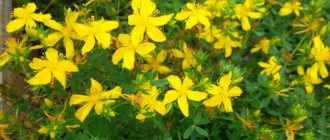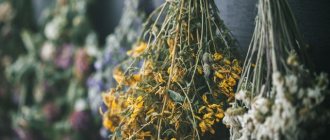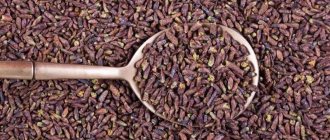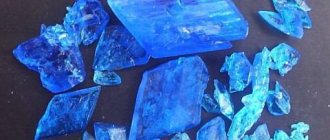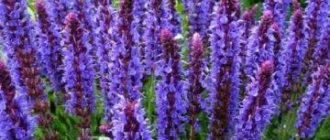The kidneys serve as a filter for the body, but, unfortunately, they are not capable of cleaning themselves. In order to prevent serious pathologies and diseases, it is recommended to closely monitor the condition of the organs, eat right, drink plenty of fluids, and avoid hypothermia.
Often, preventive measures are not enough, so traditional medicine suggests using herbal decoctions that have a number of medicinal properties as a preventive measure for the treatment of kidney diseases.
Chamomile decoction for children
It is prohibited to use powerful herbal compounds to treat children - it is better to use homemade medicines that have a gentle effect.
The most effective and efficient remedy that is allowed for children is a chamomile drink, which has anti-inflammatory, diuretic, and cleansing properties. Step by step recipe:
- Brew crushed dried herb flowers (20 grams) with boiling water (200 ml).
- Do not heat-treat the mixture - just cover the container tightly with a lid and wrap it in a scarf.
- Strain after 30-50 minutes.
Give children the prepared drink three times a day (dosage – half a glass). If the child refuses to take liquid, it is allowed to add a sweet ingredient - honey.
Do not overuse - the bee product can provoke irritation and an allergic reaction.
The cost of chamomile is from 90 rubles.
Millet decoction for adults
Homemade medicine based on millet is a powerful weapon against bacteria spreading in the kidneys, protecting against repeated organ damage.
Despite the absence of contraindications, it is recommended to use a saturated decoction only for adults; for children, choose a more gentle composition. Preparation:
- Place a handful of millet in a strainer and rinse under cold running water.
- Place the component in a cooking container, add water (one and a half cups).
- Let it simmer - after boiling, reduce the heat and simmer for a quarter of an hour (be sure to stir to prevent burning).
- Let the liquid sit for half an hour.
For adults, drink half a glass three times a day. It is recommended to carry out treatment in courses - one month on, two weeks off.
Diuretic herbs
To restore the passage of urine, you need to take a daily infusion of lingonberry leaves, mint, nettle and corn silk. The daily portion of the infusion is 0.2 liters, which is divided into three to four doses. It is necessary to mix the herbs and pour boiling water, observing the proportions of 1:100.
For sick kidneys, an infusion of the following collection will help cope with inflammation and restore the passage of urine: horsetail, birch and strawberry leaves, chicory root, caraway seeds, dill or fennel. Take half a glass three times a day. When brewing, keep the proportions of herbs and water 1:200. Regular intake of the infusion will also strengthen the body's defenses. You can take the collection after recovery as a preventive measure.
To improve urine flow, remove excess fluid from the body and relieve swelling, we recommend drinking 50 ml three times a day of infusion of dandelion, juniper and birch. For cooking you will need 1 tbsp. l. dandelion root, juniper berries, birch leaves and 400 ml of water.
For patients with impaired urine passage, an infusion of flax seeds or fennel and juniper berries is suitable. To prepare, mix all ingredients in a 4:1 ratio and pour 1 tbsp. l. collecting two glasses of water. Take the resulting infusion throughout the day, dividing it into 4 doses.
You can cope with diseases of the urinary system only with the help of combination therapy, consisting of taking herbs and medications. The doctor recommends which herbs to take, based on the diagnosis, as well as the general condition of the patient.
Rosehip decoction for pregnant women
It is equally important to monitor your kidneys during pregnancy. Strong drugs are prohibited - it is better to make do with drinks made from plant materials that have a gentle effect. Step by step recipe:
- Wash a handful of rose hips and place in a saucepan.
- Pour cold water (300 ml) and cook.
- Boil at low bubbling for a quarter of an hour.
- After straining, it is allowed to add honey (provided there are no allergic reactions).
Article for you:
Decoction, tincture, tea and infusion of senna: what helps, how to prepare and take
The prepared product is designed for the day of treatment. Take in small (up to half a glass) portions. It is advisable to maintain equal time intervals.
The cost of rose hips is 110-130 rubles.
Treatment of kidneys with lingonberry leaf decoction
“...For exacerbations of pyelonephritis, you need to take a decoction of lingonberry leaves. 1 tbsp. pour a spoonful of lingonberry leaves into a glass of boiling water, boil for 5 minutes, strain and drink 2 tbsp. spoons 3-4 times a day before meals for 2 weeks.
For chronic pyelonephritis, mix 20 g of calendula flowers, 15 g of crushed rose hips, kidney tea herb, plantain leaves and string grass, 10 g of horsetail and yarrow herbs.
1 tbsp. pour 0.5 heel of the mixture into a spoon, leave for 1 hour, strain and take 1/3 cup 3-4 times a day for 2 weeks.” M.A. Tuguz, Republic of Adygea.
Oatmeal decoction for kidney inflammation
For severe pain and rapidly spreading inflammatory processes, it is recommended to use oatmeal decoction.
Simultaneously with the elimination of symptoms, the home remedy removes harmful elements and starts the regeneration process. Step by step recipe:
- Wash the unrefined cereal grains (200 ml).
- Pour in unboiled water (1 l).
- Leave to simmer on the stove - remove after an hour.
- Be sure to leave it to brew, close the container tightly, and wrap it with a towel.
Drink oatmeal broth every two hours, dosage – a quarter glass. The duration of treatment is until the signs of the disease completely disappear.
Treatment of kidney cysts with lingonberry leaves
For kidney cysts, alternative medicine suggests taking a course of treatment at home with a remedy made from lingonberry leaves. Valuable raw materials contain a number of substances that have a beneficial effect on the disease and restore affected tissues.
Chop the leaves of the plant (50 g), tear with your hands, and brew with boiling water (500 ml). It is advisable to prepare it in a thermos - this will allow you to get a rich drink. Leave for 2 hours, strain.
Take the product without sweet additives (sugar, honey). Drink 100 ml of liquid at one time. It is recommended to drink lingonberry medicine four times throughout the day.
The cost of dry lingonberry leaves is in the range of 95-120 rubles.
Herbs for urolithiasis
To remove stones from the kidneys and bladder, herbal medicine is used as an aid. The main treatment is taking medications and following a diet depending on the chemical and organic composition of the stones. If the size of solid formations exceeds the diameter of the ureters, as well as if there are other indications, surgical intervention is required.
To dissolve the stones, a collection is used: lemon balm, sage herb, knotweed and rosehip rhizomes, on the basis of which an infusion is prepared. To prepare, mix the crushed raw materials in equal parts and add boiling water. For 60 g of herb you will need 500 ml of liquid. Leave for half an hour. Drink 150 ml before each meal.
Tea with rose hips, birch buds, flax or fennel seeds and strawberry herb will help cope with urate tumors. For a better effect, it is also recommended to add parsley, which has a beneficial effect on the organs of the urinary system. To prepare tea, you will need 5 g of each plant, which must be poured into 0.5 liters of boiled hot water and infused for 6 hours. It is recommended to drink 100-150 ml of this tea before each meal.
For stones of a phosphate nature, you need to drink 500 ml daily of an infusion of lingonberry, sweet clover, immortelle, motherwort and madder leaves. For the indicated amount of liquid, 1 tsp is needed. each type of grass. This drink must be infused throughout the day. Divide the daily volume into 6 doses.
To cleanse the kidneys and urinary tract of oxalates, you can take an infusion of wintergreen, lemon balm, bearberry and cornflower. To prepare, mix 7 g of each type and add 0.5 liters of boiling water. Let it brew for 5-8 hours. Drink half a glass before each meal.
For inflammation of the kidneys and bladder, regularly taking a decoction of corn silk helps to cope with the symptoms that accompany pyelonephritis and other inflammatory diseases. Among them is increased intrarenal pressure, causing the development of hypertension. Also, a decoction of corn silk helps to cope with swelling, improving the passage of urine.
For infectious and inflammatory pathologies of the kidneys and bladder, gulavica grass is considered effective. For treatment, you need to prepare an infusion according to the following recipe: pour 10 g of gulavica with a glass of water and leave until it cools. Take this infusion every two hours in small sips. During the day you need to drink a glass of the product.
If kidney disease is the result of inflammatory pathologies of the lower organs of the urinary system, it is necessary to take 600 ml of infusion of wild rose, motherwort and cinquefoil during the day. To prepare it, you will need 1 part of the collection and 30 parts of boiled water, which, after mixing, are infused for an hour.
For inflammatory kidney diseases, an herbal mixture is effective: 1 part each of nettle, strawberry and birch leaves, as well as 2 parts of flax or fennel seeds. For the indicated amount of herb you will need 20 parts of liquid. After the mixture boils, it must be infused for an hour. Drink this infusion four times a day.
Dill decoction for prevention
The use of homemade herbal remedies is also recommended for preventive purposes. The compositions, saturated with useful elements, will reliably protect the kidneys, while simultaneously cleaning waste and toxins that accumulate in the tissues. Step by step recipe:
- Brew the plant seeds (15 g) with boiling water (180 ml).
- Infuse, covered with a lid, for a quarter of an hour.
- Strain (use a strainer or gauze cloth).
Drink a teaspoon of the product every hour. It is allowed to be given to children and women expecting the birth of a baby - due to the absence of aggressive substances in the composition, dill will not cause harm.
The cost of dill seeds is 100 rubles.
Relieving pain with a decoction of walnut shells
If kidney disease is accompanied by severe pain, traditional medicine at home suggests using a proven recipe - a remedy prepared from walnut shells.
Only green, unripe shells should be used in preparation - part of the fruit contains substances that relieve pain.
Home medicine has a number of prohibitions - it should not be taken for chronic diseases, pathologies of the heart, blood vessels, or nervous disorders. Step by step recipe:
- Pour boiling water (1 l) over chopped green walnut shells (100 g).
- Boil, avoiding strong boiling, for 20 minutes.
- Strain after steeping (after 3 hours).
Article for you:
Walnut decoction: what is useful, what helps, how to prepare and take
The liquid tastes quite unpleasant, so you can add honey. Take 25 ml five times a day. The duration of treatment should not exceed a week. Store the decoction in the refrigerator, close the container tightly. Warm before use.
Collection of medicinal plants
“...If pyelonephritis makes itself known, I resort to the help of a herbal mixture, which includes 20 g of kidney tea, 10 g each of bearberry and horsetail leaves, 15 g each of licorice root, calendula flowers, chamomile flowers, and large plantain leaves.
1 tbsp. I pour a spoonful of herbs into a glass of boiling water, let it sit for 1 hour, and strain. I drink 1/4 glass 3-4 times a day. There is another option: I mix 40 g of flaxseed and 30 g each of field steelweed and silver birch leaves. The method of preparation and administration is the same as in the previous recipe.” Z.M. Ziyavutdinov, Dagestan.
Cranberry decoction from stones
If you have kidney stones, it is recommended to use a rich cranberry infusion. To prepare, take leaves and fruits of the plant. The composition recommended by alternative medicine should also be taken for preventive purposes - the rich liquid will prevent the formation of stones.
Cranberry remedy has almost no contraindications, but if there is an individual negative reaction to the components, it is better not to risk your health and resort to other folk treatment. A liquid brewed with cranberries will serve as an effective addition to the main treatment prescribed by a specialist.
The only caution is not to take herbal medicine or medications at the same time.
Grind cranberries (100 g) with a fork and puree them with a blender. Cut a bunch of leaves with a knife. Combine ingredients and mix. Steam the plant material with boiling water (1 l).
Continue cooking the mixture over low heat - cook, stirring the mixture regularly, for a quarter of an hour. Close the container (additionally wrap it in a scarf), strain after 3 hours.
Take 100 ml of prepared cranberry drink every three hours. If you are not allergic to bee products, you can add honey. Sugar, which improves the taste, is prohibited - under the influence of the sweet component, the effectiveness of treatment decreases.
It is recommended to take the cranberry mixture in courses. Two weeks of using the product - a week break.
Herbs for renal colic
For kidney diseases of various etiologies, the main treatment can be supplemented with herbal infusions and decoctions. Depending on the nature of the pain syndrome, various herbs are used. It is worth remembering that if renal colic and pain in the lumbar region and lower abdomen appear, you must seek help from a specialist.
For acute pain, which often indicates the presence of stones in the kidneys and ureters, an infusion of celandine and a compress with flax or fennel seeds are used. To prepare, you need to pour 2-3 tbsp. l. seeds with hot water and leave for several hours until a thick paste is obtained, which then needs to be heated and placed in gauze or a bandage.
To relieve pain and cleanse the urinary tract and kidneys of stones, drink an infusion of chamomile, mint and lemon balm. Mix one part of the herb and 20 parts of boiling water, let it brew for half an hour. Drink one glass before each meal.
If you suspect that the pain syndrome is caused by urolithiasis, prepare yourself a decoction of wild rose root according to the following recipe: chop the rose hip root (1 part) and add 20 parts of water, bring to a boil and simmer over the fire. Take this decoction two to six times, half a glass.
If a patient is suffering from nephritis and other inflammatory pathologies that are accompanied by pain, it is necessary to prepare a decoction of lingonberry leaves. This drug has anti-inflammatory, diuretic and antispasmodic effects. To prepare, add water to the leaves and simmer for several minutes. This effective remedy can replace tea.
You can cope with pain due to kidney diseases using an oil compress with herbs. To prepare it, heat any vegetable oil with the addition of chamomile, yarrow and marshmallow, observing the proportions: 5 g of herb per 100 ml of oil. Soak gauze, cloth or bandage in this herbal oil and apply to the sore spot for an hour.
A decoction of carrot seeds will help soothe renal colic. To prepare it, mix 50 g of seeds and 600 ml of water. Bring the mixture to a boil and simmer under the lid for about half an hour. Let the broth brew until it cools. Take 10 ml six times a day every 2-3 hours.
Cleansing with parsley decoction
Another plant that is recommended for use for kidney problems is parsley. Seeds and green spices have many positive qualities - they effectively cleanse tissues, prevent the re-accumulation of toxins and waste, and relieve pain.
A course of cleaning with parsley decoction should be carried out twice a year. To brew a home remedy, you can even take dry leaves - this will not affect the healing properties.
Liquid brewed with plant raw materials is harmless to the human body - parsley does not contain elements that cause negative reactions.
Chop a large bunch of spice into a small green paste (if the product is prepared from dry raw materials, simply rub 20 grams of the product with your hands). Combine the seeds of the plant (20 grams) and the green mass prepared from the leaves. Steam with boiling water (400 ml).
Article for you:
Birch decoction: what is useful, what helps, how to prepare and take
Do not cook - prolonged heat treatment destroys important compounds for the human body. Strain after infusion (after about half an hour).
Start taking it in the morning - drink 200 ml of liquid instead of morning coffee. The next use of herbal medicine is in the afternoon, a quarter of an hour before lunch.
The dosage does not change. The last dose is in the evening, two hours before going to bed. Do not drink liquid just before going to bed - the product has an increased diuretic effect.
Treatment should be carried out for at least a week. Repeat the course after a short pause - in a month. Two courses a year are enough for cleansing - the power of the plant will protect the kidneys and prevent the accumulation of harmful substances that are dangerous to the human body.
The cost of parsley seeds is 110-130 rubles.
Nettle infusion
Nettle leaves will bring invaluable benefits in the treatment of kidney diseases. The main thing is to collect young plant materials containing a number of elements that promote cleansing and restoration of organs.
Nettle also has anti-inflammatory properties and relieves pain. The advantage of the plant is that there are no restrictions on use, the home remedy will not cause irritation or allergies even in people with hypersensitivity.
Finely chop young nettle leaves (50 g), steam with boiled water (230 ml). Leave for half an hour. Strain after complete cooling. Do not experiment - adding additional components in the form of honey and sugar is prohibited.
Take the remedy prepared according to the folk recipe only twice a day. Divide the prepared liquid in half, place one part in the refrigerator, and drink the second on an empty stomach in the morning. In the evening, heat the remaining mixture and consume an hour after dinner.
Continue treatment for two weeks. Complex effects on the kidneys are allowed - the use of medications, herbal decoction, but it is better to first consult a specialist.
Finally
Treatment of kidney diseases should not be delayed - such negligence can lead to serious complications. Herbal compositions will bring undeniable benefits, will help cope with the problem - they will cleanse from harmful elements, relieve pain, and restore lesions.
You should also take an aromatic liquid prepared with herbs for preventive purposes - the active ingredients that abound in home remedies can easily prevent the development of the disease, improve kidney function, and prevent the accumulation of toxins.
Best Herbs for Kidney Treatment
Kidney diseases should be treated using traditional recipes only under the supervision of the attending physician, who will advise a truly effective remedy in each specific clinical case, rule out the patient’s contraindications to its use, and prescribe adequate dosages of the medication.
Currently, many recipes are known to improve the condition of the kidneys and stop the progression of chronic inflammation in their parenchyma. Here are the most popular ones.
You will need:
- asparagus – 1 part;
- parsley root – 1 part;
- fennel – 1 part;
- celery – 1 part.
All components should be crushed and mixed. To prepare the decoction, take a tablespoon of the resulting mixture and pour a glass of cold water.
After soaking the product for several hours, it must be brought to a boil and cleaned of the cake. Take the prepared broth several small sips throughout the day.
You will need:
- parsley root – 2 pieces;
- milk – 0.5 l.
Clean the parsley roots from dirt and grate them on a fine grater. Pour the resulting slurry with milk and water in equal quantities. Boil the mixture over low heat for about 10-15 minutes, then cool and take 100 ml three times a day after meals.
You need to take:
- lingonberries – 0.5 kg;
- sugar – 1 kg.
Grind fresh berries in a blender and mix with sugar. Then put the resulting jelly into small jars, which should be stored in the refrigerator. If necessary, dilute a tablespoon of jelly in 100 ml of warm water and take twice a day.
This product perfectly suppresses the manifestations of inflammation, helps eliminate swelling, improves immunity and saturates the human body with valuable vitamins.
Would need:
- half-fallen grass – 10 g;
- boiling water – 200 ml.
Pour a glass of boiling water over the crushed parts of the plant and leave for no more than two hours. The finished infusion should be taken warm and three tablespoons after meals.
As you know, a product based on pol-palm has a detrimental effect on tooth enamel, so after each use it is recommended to rinse the mouth with a soda solution.
To prepare the product you need to take:
- yarrow herb – 1 part;
- garden currant leaves – 1 part;
- succession grass – 1 part;
- dead nettle flowers – 1 part;
- burdock roots – 2 parts;
- wild strawberry leaves – part 2;
- violet trifoliate herb – 2 parts;
- birch buds – 2 parts;
- bearberry leaves – 3 parts.
Pour two tablespoons of herbal mixture into 1 liter of warm water and boil for 15 minutes over low heat. Take the finished decoction 50 g every two hours for exacerbations of chronic nephritis.
Traditional medicine offers a large list of plants that may be relevant for kidney inflammation. Quite popular:
- corn silk;
- knotweed;
- bearberry;
- rose hip;
- blue cornflower;
- kidney grass;
- yarrow;
- chicory;
- horsetail;
- various renal fees.
Corn hair is actively used for kidney inflammation, cystitis and urolithiasis. It is used in the form of classic decoctions and water infusions. It has a pronounced diuretic and anti-inflammatory effect, and also promotes faster and less painful removal of sand and stones from the excretory system.
Knotweed is another herb favored by nephrologists and traditional healers. This herb is good for treating kidney inflammation because it promotes good filtration of the kidneys and has a diuretic effect.
Bearberry perfectly enhances urination and has a pronounced bactericidal and anti-inflammatory effect. This plant is used instead of tea, and also in the form of a water infusion, decoction or alcohol tincture.
Yarrow will be very useful if nephritis is accompanied by cystitis. This herb has a pronounced anti-inflammatory and astringent effect. Water infusion and decoction of yarrow are widely used in urology.
Horsetail is a good diuretic that is used for kidney diseases, however, not in all cases. It is best to consult your nephrologist regarding this herb.
Necessary ingredients: zest of 1 lemon, linden leaves - 20 g, water - 2 cups. Mix the chopped zest with linden leaves and add boiling water. Leave the mixture for 24 hours. Directions for use: 5 ml three times a day 30 minutes before meals. Take no more than 10 days. Then take a week's break and repeat again.
The following herbal mixture can be used:
- 3 parts – licorice root, golden rod herb;
- 2 parts - cinquefoil, knotweed herb, wormwood herb, lingonberry leaf, larkspur root, dog nettle herb, St. John's wort herb, violet herb;
- 1 part – Mongolian tea root, bearberry leaf, oregano herb.
Pre-grind the collection in a coffee grinder. Then 2 tbsp. spoons, pour 0.5 liters of boiling water and leave overnight in a thermos. Take 25 ml 3 times a day an hour after meals. The duration of the course is 2 months. After a two-week break, repeat the course again.
Fruit and root collection will help. Juniper fruits – 60 g, fennel fruits – 20 g, licorice root – 20 g. To prepare the decoction, you first need 1 tbsp. Infuse a spoonful of this mixture in a glass of cold water for 6 hours, and then boil for 15 minutes. You need to drink the resulting decoction in several doses throughout the day.
A mixture of comfrey and goldenrod is also good for healing. To prepare a water infusion, you need 20 grams of the mixture (take herbs in equal proportions), pour 0.5 liters of boiling water and leave in a thermos overnight. Strain in the morning. Drink 100 ml 3 times a day an hour after meals. Course duration is 1 month. After a week break you can repeat it again.
Treatment with oats is very effective. Method of preparation: oats are poured with boiling water (1:4) and evaporated over low heat. You need to ensure that a quarter of the liquid evaporates, then cool and strain. Drink half a glass up to 4 times a day between meals.
Onion peel has a pronounced diuretic and cleansing effect. An infusion of a mixture of husks, pine needles and rose hips is a remedy that has many positive reviews. The mixture is boiled for 25 minutes, left for 24 hours and then taken a glass 3 times a day.
There are various recipes for effective vegetable cocktails for kidney inflammation. However, each juice recipe is allowed to be used for no longer than 2 weeks. Then you must definitely take a break and change the juices.
Pills made from burdock and duckweed are also used. You will need: burdock seeds - 50 g, duckweed seeds - 50 g, honey - 100 g. The seeds are ground into powder and honey is added to them. From the resulting blend you need to form pills, about 5 grams each. Take 1 pill 3 times a day an hour after meals.
It is effective to consume watermelon in large quantities to flush the kidneys. Zucchini, melons, and grapes also have a good effect on the kidneys.
Any inflammation of the kidneys should not be started, since kidney failure can become a serious complication of such diseases.
You need to be prepared for the fact that treatment with folk remedies will not give immediate results. It must be carried out in courses and for a sufficiently long time.
All the classic herbs used to treat the kidneys contain either essential oils that destroy bacteria and kill germs living in your urinary tract, or so-called diuretics, herbal remedies that work as a diuretic, causing you to urinate more.
Juniper berries
Perhaps the best remedy for the kidneys are juniper berries. The rich chemical composition, resinous, balsamic and tannin substances, essential oils and organic acids of the berries make them indispensable in the treatment of various diseases of the kidneys and urinary system.
Juniper berries work not only as a good diuretic, they are also a very strong antimicrobial and disinfectant. For inflammation of the bladder and urinary tract, and for various inflammations of the kidneys, berries are the most effective healing plant.
The berries have a pleasant taste and aroma and are actively used in cooking. Basically, only ripe berries are used, they can be consumed in any form, raw, dried, ground, you can make whatever you like based on juniper berries - teas, extracts, decoctions, infusions.
It is also worth saying that juniper comes in different types, the one that is suitable for treating kidneys has 5-7 small seeds in the berry. Juniper, which has only one slightly larger seed, is an excellent remedy for the pancreas and is used to treat diabetes.
I once read that in 2009, scientific research was carried out by the European Medicine Agency, and so, they did not reveal any special properties in juniper berries, therefore scientific medicine does not recommend these berries as a serious medicine, which I am not at all surprised by. You can even often find mention in medical articles that they are poisonous.
To be honest, I have never heard of anyone being poisoned by juniper berries and dying, but more than one thousand people have died from poisoning with their notorious “medicines”. The maximum that can happen from poisoning with juniper berries is vomiting or diarrhea, but this is not fatal, and in some cases it is even useful, it will make your intestines and stomach cleaner.
